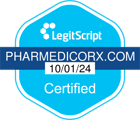Magnesium and Potassium Supplements: Can You Take Them Together?
Magnesium and Potassium are nutrients that perform a range of important functions in the body.
And, while it is best to try and hit your targets through eating a healthy and varied diet, supplementation is sometimes necessary.
Below, we will answer some common questions regarding Magnesium and Potassium including what their functions are in the body, which foods are rich in these nutrients, if you can take them both together, how much to take, and where to buy a good combination supplement.
Read Related: Liquid Magnesium: Benefits, How To Use, and Where to Buy
What does Magnesium do for the body?
Magnesium is an abundant mineral that functions as a cofactor in over 300 enzymatic reactions in the body.
Some of these biochemical reactions include blood pressure and blood sugar regulation, nerve and muscle function, and protein synthesis.
Energy production, healthy bone development, DNA and RNA synthesis, normal heart rhythms, nerve impulses, and muscle contractions are also part of where Magnesium plays a role in the body.
What does Potassium do for the body?
Potassium's roles are essential for a balanced and well-functioning body.
Potassium is an electrolyte mineral that helps maintain proper water balance in your cells, it also plays a role in muscle contractions, electrical nerve transmissions, and healthy kidney function.
A potassium deficiency can develop due to a number of reasons including: excessive vomiting, diarrhea, sweating, starvation, laxatives, diuretics, and kidney dialysis.
Which foods contain Magnesium and Potassium?
When you are aiming to meet your nutritional goals, it is always best to try and hit your targets by consuming healthy foods first.
Below, are some foods that are high in Magnesium and Potassium.
Foods that are high in Magnesium:
Some of the foods that have higher levels (>40mg per serving) of Magnesium include:
-
Pumpkin seeds
-
Chia seeds
-
Almonds
-
Spinach
-
Cashews
-
Peanuts
-
Shredded wheat cereal
-
Soymilk
-
Black beans
-
Edamame
-
Peanut butter
-
Potatoes
-
Brown rice
-
Yogurt
-
Fortified breakfast cereals
Foods that are high in Potassium:
Foods that you can include in your diet that are higher in Potassium (>300mg per serving) include:
-
Dried apricots
-
Lentils
-
Squash
-
Dried prunes
-
Raisins
-
Baked potatoes
-
Kidney beans
-
Orange juice
-
Soybeans
-
Bananas
-
Milk
-
Spinach
-
Chicken
-
Yogurt
-
Salmon
-
Beef
-
Molasses
Foods that are high in BOTH Magnesium and Potassium:
There are also foods that have decent amounts of both Magnesium and Potassium including:
-
Spinach
-
Soybeans
-
Potatoes
-
Yogurt
-
Swiss chard
-
Cannellini beans
-
Acorn squash
-
Salmon
-
Avocados
Why some people use Magnesium and Potassium supplements
If you try to eat a healthy diet with a variety of foods to hit your nutritional targets, but still seem to have inadequate levels of Magnesium and Potassium, your doctor may recommend supplements to help bridge the gap and get your levels within range.
Supplementation may also be a good idea for people who have certain health conditions or take medications that make Magnesium and Potassium nutritional deficiencies more likely.
Talk with your doctor about your supplementation needs for these two nutrients.
Can you take Magnesium and Potassium supplements together?
Not only can you take Magnesium and Potassium supplements together, it may actually be a very smart idea.
Potassium and Magnesium can be common deficiencies in the general population, so supplementing with both at once may be a good way to correct both issues.
Also, they work closely in the body with each other.
Studies have found that disturbances in Magnesium levels can even lead to the depletion of Potassium. This may have to do with increased membrane permeability when there is not enough Magnesium, causing the intracellular Potassium to "leak out" of the cell and be excreted in the urine.
However, if you do not have a deficiency in these nutrients, you do not want to over-supplement as there can be negative side effects associated with taking too much Magnesium or Potassium.
Talk with your doctor so that they can review your levels, other conditions, and current medications, and see if Magnesium and Potassium supplements are a good fit for you.
How much Magnesium and Potassium should you take?
Potassium:
The adequate daily dietary intakes recommended for Potassium differ between adult males and adult females.
For adult males over 19 years of age, an intake of 3,400mg (3.4gm) is recommended.
For adult females over 19 years old, they need an intake of 2,600mg (2.6gm).
When looking into a Potassium supplement, it is normal to see strengths of about 80mg of Potassium in a multivitamin formula, or up to 99mg in a Potassium-only supplement.
Magnesium:
The recommended dietary allowance for Magnesium is also slightly different between adult males and females.
For adult males over the age of 19, the daily intake is recommended to be between 400mg-420mg.
For adult females over 19, the daily intake should be between 310mg-320mg.
Also note: The recommended amounts of Potassium and Magnesium also change during pregnancy and breastfeeding for women.
Magnesium and Potassium combination supplements at Pharmedico Pharmacy
You can order high-quality Magnesium and Potassium combination formulations from reputable supplement brands online though Pharmedico Pharmacy.
The Reacted Magnesium and Potassium supplement from Ortho Molecular Products is a good choice for a combination Potassium and Magnesium supplement that uses highly-absorbable forms of these supplements.
This supplement contains 170mg of Magnesium in the Dimagnesium Malate TRAACS Magnesium lysinate glycinate chelate form, and 85mg of Potassium in the Potassium Glycinate Complex form in 2 capsules.
You can purchase Ortho Molecular Products Reacted Magnesium & Potassium directly from our pharmacy for only $33: Here.



Leave a comment